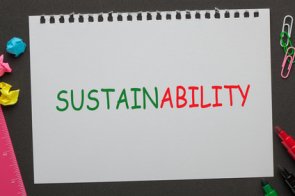
On the Importance of Teaching Sustainability
You simply cannot open a newspaper or science journal without seeing significant evidence of the toll the climate crisis is taking on our environment. More and more people are talking about global warming due to the increasing number of challenges it presents for cities, countries and really everyone living on this planet.
Despite the increase in information and resources available on climate change, only 42 percent of educators are actually teaching lessons on the subject (source: NPR poll). Considering the fact that the next generation will be the one to face and hopefully provide solutions to the environmental issues they are inheriting, it is vital that our educational institutions begin integrating lessons and tools to prepare them for a future in a warming and increasingly more demanding world.
Parents and teachers appear to be in agreement… According to the most recent poll conducted by NPR, 80 percent of parents and 86 percent of teachers in the U.S. support the teaching of climate change. While global events and awareness days such as Earth Day allow students an opportunity to participate and have a day to take action and understand climate change, there seems to be a disconnect between such isolated events and the classroom. Although most states have classroom standards that at least mention human-caused climate change, most teachers aren't actually talking about climate change in their classrooms. And fewer than half of parents have discussed the issue with their children.
With such strong agreement on teaching students about current and real environmental challenges, one may ask why there isn’t more information provided in the classroom and to families on the matter. According to the NPR poll, 65 percent of teachers stated that it is outside of their subject area, and 20 percent expressed that their students are too young to begin learning about climate change. And while parents and teachers expressed mutual agreement in teaching the subject matter, almost a third of all teachers stated that when it comes to teaching climate change, they worry about parent complaints.
With such figures, it is clear that discussions on climate change need to take place, starting with parents and teachers opening the lines of communication. Additionally, stages of discussion and action must take place on an institutional level, alerting other educators, principals and school officials to the urgent need for rigorous, standards-based climate science education in schools.
For students, having the latest information on how climate change is impacting the environment is just one part of the learning process – Along with the issues, students must be presented with solutions. For young and impressionable minds to only be taught of the harsh realities without opportunities for change and improvement is discouraging and doesn’t allow students to understand their importance and role in helping the environment. They must be provided with the education, tools and resources for making a difference, understanding careers within fields that address climate change and having hands-on experience with technology that can help preserve our natural resources.
Hands-on educational tools and learning guides such as those offered by AquaGrove provide students with real-world experience and empower them to take ownership and responsibility for sustainable living. In the classroom, AquaGrove enables students to utilize aquaponics to learn about the life cycle, sustainable gardening, water conservation, food security and so much more. While the environmental issues and climate change aren’t going away overnight, it is important that children understand that they can make a difference and that the future will be brighter with the right actions, sustainable practices and proper education.
To learn more about how you can improve and enhance teaching sustainability in the classroom, contact AquaGrove.
